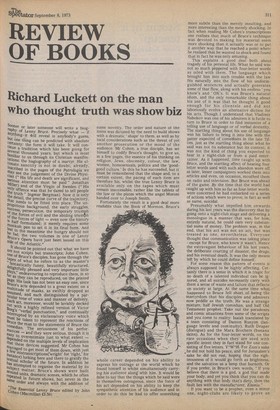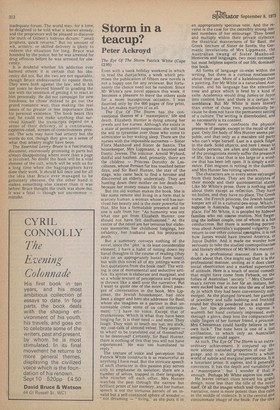REVIEW OF BOOKS
Richard Luckett on the man Who thought truth was show biz
Sooner or later someone will write a biography Of Lenny Bruce. Precisely what — if anything. it *ill reveal is anybOdy's guess, but one tging can be predicted with absolute certainty: the form it will take. It will continue a tradition which has been going for several thousand years, but which is most familiar to us through its Christian manifestations: the hagiography of a martyr. His ultimate sanctity is not in doubt; already, Inscribed in the pages of the Patrologia we may see the judgement of the Divine Physician (" His life and death are significant, and serious attention must be paid" Jonathan Miller) and of the Virgin of Sweden (" His „°n1Y offence was that he dared to tell people the truth" Ingmar Bergman). Now it is only the detail, the precise curve of the trajectory, that needs to be fitted into place, The unPropitious background, the early struggles, success, persecution, the temporary triumph of the forces of evil and the abiding triumloh of the forces of light — even now the history la half formulated; it merely requires some lest pen to set it in its final form. And be in the meantime the hungry should not ';'f.e. fed, the two volumes in one of Lenny Bruce's Opera have just been issued on this Side of the Atlantic.* It should be pointed out that what we have are not scripts but transcripts; John Cohen, ,orie of Bruce's disciples, has gone through the tapes of what he refers to as the master's fantastically funny, beautifully structured, delightfully phrased and very important little Plays," endeavouring to reproduce them, in so tar as they can be reproduced, on the printed Page. His task has not been an easy one, since uruce's acts depended to a great extent on a Multitude of masks, as swiftly dropped as assumed, and each distinguished by a particular tone of voice and manner of delivery. r--ach act, moreover, would be lavishly decked 'et with a ;highly refined version of Victor org's "verbal punctuation," and continually interrupted by an exclamatory voice which Tust be taken to represent the reactions of ruce the man to the statements of Bruce the comedian. The seriousness of his perforMances --,-aricrtheY were serious, though it is ease
to overestimate just to what extent •
,,Feuuea on the multiple levels of implication that these devices suggested. Mr Cohen has managed tO get most of them down with just a fewtm . stranscriptions( wright, f for right, or i!lstance) lurking here and there to gratify the e xtual scholar of the future. In addition he has attempted to organise the material by its Subject matter; Bruce's shows were built around units, dramatic scenes, which he often repeated in future shows, but never in the
Me order and always with the addition of
The Essential Lenny Bruce edited by John Cohen (Macmillan £3.50) some novelty. The order and nature or the items was dictated by the need to build shows with a dramatic 'shape' to them, as well as by local considerations such as the threat of yet another prosecution or the mood of the audience, Mr Cohen, a true disciple, has set himself to codify Bruce's thought, to give us, in a few pages, the essence of his thinking on religion, Jews, obscenity, colour, the law, women, homosexuals, politics and the 'goodgood culture.' In this he has succeeded, but it must be remembered that the shape and, to a certain extent, the pacing of each item are therefore his, whilst the true Lenny Bruce is available only on the tapes which must remain inaccessible, rather like the tablets of the law or the plates which the angel Moroni handed over to Joseph Smith.
Fortunately the result is a good deal more readable than the Book of Mormon. Bruce's
whole career depended on his ability to express his outrage at the world which he found himself in whilst simultaneously carrying his audience along with him. It would be false to say that the things which he said were in themselves outrageous, since the force of his act depended on his ability to keep the sympathetic attention of his audience and in order to do this he had to offer something more subtle than the merely insulting, and more interesting than the merely shocking. In fact when reading Mr Cohen's transcriptions one realises that much of Bruce's technique was devoted to making his material seem more shocking than it actually was or to put it another way that he reached a point where he realised that he wanted to shock and found that in fact he was only amusing.
This explains a good deal both about tragedy of his personal life. What he said was not so much peppered with four-letter words as oiled with them. The language which brought him into such trouble with the law fits naturally into the flow of his undistinguished sentences and actually generates some of that flow, along with his endless 'you know's and ' OK's. It was Bruce's natural idiom, and the only remarkable thing about his use of it was that he thought it good enough for his clientele and did not laboriously evolve an alternative diction for his acts. Though I understand that Vladimir Nabokov was one of his admirers it is futile to turn to Bruce in order to find instances of a telling use of language or of verbal dexterity. The startling thing about his use of language was his failure to bring it into line with the patter expected of Comedians in the late 'fifties, just as the startling thing about what he said was not its substance but its context; it was not the kind of thing you expected to hear in a night-club or from a paid entertainer: As it happened, time caught up with Bruce, and the startling effect of hearing four letter words used with such abandon wore off as later, lesser campaigners worked them into articles and even, on occasion, mouthed them on radio and television. But Bruce was ahead of the game. By the time that the world had caught up with him so far as four-letter words were concerned he had embarked on a series of actions which were to prove, in fact as well as name, suicidal.
Presumably what impelled him onwards during his last years was the discovery that by going onto a night-club stage and delivering a monologue in a manner that was, for him, entirely natural, he could earn very substantial sums of money. The problem was, in the end, that his act was not an act, but was treated as one, nevertheless. Everyone thought that communication was taking place except for Bruce, who knew it wasn't. Hence the extravagant behaviour of his last years, the deliberate courting of disaster, the drugs, and his eventual death. It was the only means left by which he could define himself. For some reason this pattern of events is always supposed to be highly affecting. Certainly there is a sense in which it is tragic for no death of a talented individual can be ignored, and all suicides necessarily carry with them a sense of waste and failure that reflects on society at large. At the same time what.--happened to Bruce fell short of being the martyrdom that his disciples and admirers now peddle as the truth. He was a strange mixture, half Jewish comedian, and half Old Testament prophet. Take out the paradoxes and comic situations from some of the scripts and you come to reality: Isaiah translated by a team consisting of Damon Runyon (language levels and continuity), Ruth Draper (dialogue) and the Marx Brothers (banana skins). As for the four-letter words, on the rare occasions when they are used with specific intent they in fact stand for one consisting of five letters. Y*W*H. For Zion's sake ;,he did not hold his peace, and for Jerusalem's sake he did not rest, hoping that the righteousness of it would go forth as brightness, and the salvation as a lamp that burneth. Or if you prefer, in Bruce's own words, "If you believe that there is a god, a god that made your body, and yet you think that you can do anything with that body that's dirty, then the fault lies with the manufacturer, Ernmis."
If you want to be a prophet, even a minor one, night-clubs are likely to prove an
inadequate forum. The world may, for a time, be delighted to be told what it knows already, and the proprietors will be pleased to discover the truth of Gilbert's hideous dictum: "small prophets, quick returns." But no amount of wit, artistry, or skilled delivery is likely to redeem the situation for long. Bruce was hounded by the police, but he was arrested for drug offences before he was arrested for obscenity.
It is doubtful whether his addiction ever harmed others; it is certain that his obscenity did not. But the two are not equatable, though Bruce endeavoured to equate them. They were both against the law, and in his last years he devoted himself to goading the law with the intention of getting it to react at him personally. He did not campaign for new freedoms; he chose instead to go out the grand romantic way, thus making the real issues of no greater or less importance than his personal existence. The book bears this out; he could not make anything that survived himself: the transcripts depend on a sense of their delivery, of a continuous, expletive-oiled, stream-of-consciousness present. The acts may have had artistry but the words do not, though they give us a sense of what that artistry might have been.
The 'Essential Lenny Bruce is a fascinating document, enormously promising in parts but always disappointing where more than a page is involved, No doubt the book will be a vital element of the cult, which will be with us for a long time when the hagiographers have done their work. It should kill once and for all the idea that Bruce ever managed to be genuinely obscene. On the other hand it makes something else clearer than it was before: Bruce thought the truth was show-biz. It was a fatal — though not uncommon — mistake.



































 Previous page
Previous page